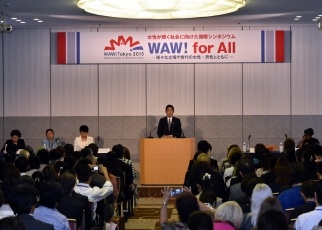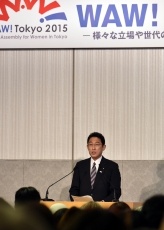Women's Empowerment and Gender Equality
Remark by Foreign Minister Kishida at the Opening Session of the High-level Roundtable WAW!2015
August 29, 2015


Ladies and Gentlemen,
I would like to warmly welcome you all to the second World Assembly for Women. This year, we have an attendance of approximately 150 people from about 40 countries, nearly doubled compared to last year. I feel grateful that more and more people are interested in WAW!.
The Abe administration decided that Japan would take a lead in the field of women. WAW! shows such a commitment in a concrete way. Making it possible for women to exert their great potential is Japan’s immediate challenge as we will enter into an aging society faster than any other countries.
Japan has been transforming our determination into action. In our new Development Cooperation Charter, which we formulated last year, we stipulated for the first time ever the importance of promoting the participation of women as a bearer of development.
On disaster risk reduction, Japan proposed to attach importance to women’s participation in this field, at the Third UN World Conference on Disaster Risk Reduction.
Today, we have prepared a handout on Japan’s implementation of “WAW! To Do,” which I summarized as a chair last year. I would like to underline that “WAW! To Do” is a document presented to the world. So I hope not only Japanese people but also people around the world will follow-up this list.
“WAW! for All” is this year's theme. At today’s high-level roundtable, we have a table to discuss the issues of men’s participation and another to address challenges women with great difficulty face. We are also providing a place for discussion among young people.
On global issues, we have three tables with the themes of education, peacebuilding, and international cooperation. Japan will do its utmost to make the 21st century a world with no human rights violations against women. I hope today’s discussion will contribute to creating such a world.
Promoting women’s active participation in the society serves everyone including men, children and the elderly. I would like to close my remarks by hoping that all of you will have frank exchanges of views today and make this year’s conference productive.
I would like to warmly welcome you all to the second World Assembly for Women. This year, we have an attendance of approximately 150 people from about 40 countries, nearly doubled compared to last year. I feel grateful that more and more people are interested in WAW!.
The Abe administration decided that Japan would take a lead in the field of women. WAW! shows such a commitment in a concrete way. Making it possible for women to exert their great potential is Japan’s immediate challenge as we will enter into an aging society faster than any other countries.
Japan has been transforming our determination into action. In our new Development Cooperation Charter, which we formulated last year, we stipulated for the first time ever the importance of promoting the participation of women as a bearer of development.
On disaster risk reduction, Japan proposed to attach importance to women’s participation in this field, at the Third UN World Conference on Disaster Risk Reduction.
Today, we have prepared a handout on Japan’s implementation of “WAW! To Do,” which I summarized as a chair last year. I would like to underline that “WAW! To Do” is a document presented to the world. So I hope not only Japanese people but also people around the world will follow-up this list.
“WAW! for All” is this year's theme. At today’s high-level roundtable, we have a table to discuss the issues of men’s participation and another to address challenges women with great difficulty face. We are also providing a place for discussion among young people.
On global issues, we have three tables with the themes of education, peacebuilding, and international cooperation. Japan will do its utmost to make the 21st century a world with no human rights violations against women. I hope today’s discussion will contribute to creating such a world.
Promoting women’s active participation in the society serves everyone including men, children and the elderly. I would like to close my remarks by hoping that all of you will have frank exchanges of views today and make this year’s conference productive.

